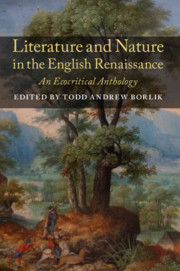Book contents
- Frontmatter
- Contents
- List of Illustrations
- Acknowledgements
- Editorial Principles: Towards the Ecocritical Editing of Renaissance Texts
- Introduction
- PART I Cosmologies
- PART II The Tangled Chain
- PART III Time and Place
- PART IV Interactions
- PART V Environmental Problems in Early Modern England
- Population
- Enclosure
- Deforestation
- The Draining of the Fens
- Pollution
- PART VI Disaster and Resilience in the Little Ice Age
- Appendix A Industrialization and Environmental Legislation in the Early Anthropocene: A Timeline
- Appendix B Further Reading: A Bibliography of Environmental Scholarship on the English Renaissance
The Draining of the Fens
from PART V - Environmental Problems in Early Modern England
Published online by Cambridge University Press: 05 June 2019
- Frontmatter
- Contents
- List of Illustrations
- Acknowledgements
- Editorial Principles: Towards the Ecocritical Editing of Renaissance Texts
- Introduction
- PART I Cosmologies
- PART II The Tangled Chain
- PART III Time and Place
- PART IV Interactions
- PART V Environmental Problems in Early Modern England
- Population
- Enclosure
- Deforestation
- The Draining of the Fens
- Pollution
- PART VI Disaster and Resilience in the Little Ice Age
- Appendix A Industrialization and Environmental Legislation in the Early Anthropocene: A Timeline
- Appendix B Further Reading: A Bibliography of Environmental Scholarship on the English Renaissance
Summary
In the sixteenth century, a fan-shaped swathe of eastern England in the vicinity of the Wash estuary was chequered with low-lying wetlands known as fens. Inundated for much of the winter, the sparsely populated fen region encompassed almost 1,500 square miles and was one of the country's last remaining bastions of genuine wilderness. While Drayton acknowledges that outsiders sniffed at the fens as a putrid, disease-infested morass, he more emphatically praises them as a precious habitat for a teeming abundance of plants, fish, and fowl. His poetic catalogues could be compared to a recent biodiversity audit of the fens which inventoried over 13,000 species of flora and fauna, including a quarter of the rarest wildlife in Britain, of which 25 are found nowhere else on earth (Mossman et al). Drayton also glowingly depicts the bioregional economy of the fen-dwellers, who supported themselves by fishing, fowling, seasonal grazing, and harvesting sedge and peat. Appearing at a time when the fens had become the target of ecologically disastrous drainage schemes, the quarrel between Holland and Kesteven sounds almost like a parliamentary debate on the topic, in which the poet makes a tacit plea for conserving fens as part of England's environmental heritage.
Source: Poly-Olbion, 2.105–10.
Now in upon the earth, rich Lincolnshire I strain, °
At Deeping, from whose Street the plenteous Ditches drain °
Hemp-bearing Holland's Fen, ° at Spalding that do fall
Together in their course, themselves as emptying all
Into one general Sewer, which seemeth to divide
Low Holland from the High, which on their Eastern side
Th'inbending Ocean holds ° …
From fast and firmer Earth, whereon the Muse of late
Trod with a steady foot, now with a slower gait,
Through Quicksands, Beach, and Ooze, ° the Washes ° she must wade,
Where Neptune every day doth powerfully invade
The vast and queachy ° soil, with Hosts of wallowing Waves,
From whose impetuous force that who himself not saves,
By swift and sudden flight, is swallowed by the deep,
When from the wrathful Tides the foaming Surges sweep
The Sands, which lay all nak'd to the wide heav'n before,
And turneth all to Sea, which was but lately Shore° …
- Type
- Chapter
- Information
- Literature and Nature in the English RenaissanceAn Ecocritical Anthology, pp. 448 - 468Publisher: Cambridge University PressPrint publication year: 2019



